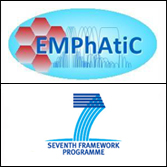
End: 30/06/2015
Funding: European
Status: Completed
Advanced Signal and Information Processing (ASIP)
Acronym: EMPHATIC
The objective of EMPhAtiC is to develop, evaluate and demonstrate the capability of enhanced multicarrier techniques to make better use of the existing radio frequency bands in providing broadband data services in coexistence with narrowband legacy services. The project will address the Professional Mobile Radio (PMR) application, and in particular the evolution of the Public Protection & Disaster Relief (PPDR) service currently using TETRA or other legacy systems for voice and low-speed data services. Both cell-based and ad-hoc networking solutions are needed for PPDR and will be developed.
Our main emphasis is on filterbank based multicarrier (FB-MC) and single-carrier (FB-SC) waveforms for utilizing effectively the available fragmented spectrum in such heterogeneous environments. The core idea is to develop a multi-mode radio platform, based on variable filter-bank processing, which is able to perform modulation/detection functions simultaneously for different signal formats with adjustable centre frequencies, bandwidths and subchannel spacings. SC-FDMA waveforms are included in the study in order to relax the transmitter power amplifier requirements of mobile terminals. Enhanced OFDM solutions are also considered as alternatives aiming at minimal modifications to the 3GPP LTE standard, which serves as the reference system in the studies. In addition to physical layer functionalities, the project also develops MIMO and MAC-layer techniques, as well as relay networking solutions which are compatible and maximize the benefits of the waveform level solutions.
The EMPhAtiC consortium has a strong expertise in the design of practical TETRA and ETSI BRAN systems and a very good track record in the development of FB-MC and FB-SC data transmission systems. We believe that the design of FB-MC schemes facilitating flexible and efficient multi-access spectrum usage, along with a proof of concept implementation, form the necessary basis for proposing better next generation broadband data solutions for the PMR evolution and other applications, including the 3GPP LTE evolution.
Coordinator
